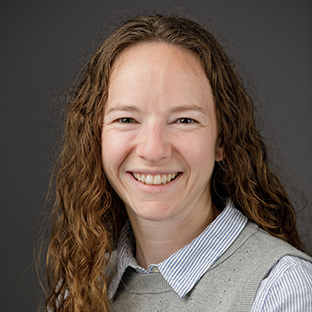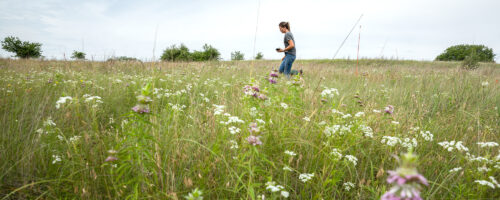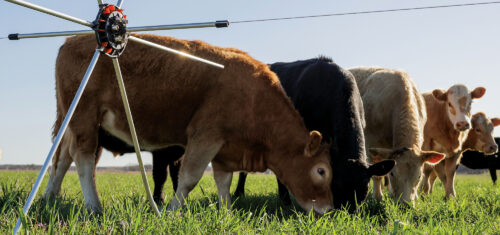80 Years and Counting
Noble celebrates voices from the land: Ranchers share their memories of working with Noble staff and the lessons they've carried with them through the years.
On Sept. 19, 1945, Lloyd Noble founded The Samuel Roberts Noble Foundation to help revitalize agriculture after the Dust Bowl. Eighty years later, Noble Research Institute carries on our founder’s vision to safeguard the soil and help agricultural producers advance land stewardship practices.
To celebrate Noble’s eight decades of research, collaboration and producer guidance, we’ve asked a few folks to share the history of Noble based on how the organization has influenced their lives and ranches. Each rancher’s responses are presented in his or her own words, lightly edited for length and clarity.

William C. & Ian Chapman
Chapman Ranch & 4C Ranches
Q: Do you remember your first experience with Noble?
William: As an Ardmore native, I always knew about The Noble Foundation and interacted with the Noble family from time to time. When I came back in the early ’60s, the national beef industry was transitioning from a farmer/feeder system to a large-volume feedlot system. Many of the producers in southern Oklahoma would sell their calves upon weaning (around 500 pounds), and they would be sent to the farm-belt states to our north where individual farmers would fatten and feed them out to a finished weight. As the western feedlots grew during the 1960s, they wanted an animal more in the 750-to-800-pound category. To help local producers meet this need, Noble helped us transition some of our land into fall-planted winter wheat and educated us on how to graze out stocker calves on that wheat. It was a fairly new concept. Planting and growing the green pasture was new to many of us who had been traditional cow/calf operations utilizing native grass pasture. The needs, nutritional and veterinarian, of an older, larger calf were also different. Noble helped me navigate all of these things in my early years back on the ranch.
Ian: When I came back from college in the early 1990s, the concept of rotational grazing was becoming commonplace. Noble was instrumental in helping us understand the benefits of rotational grazing and how to best implement those concepts on our ranch. I spent a large part of my first decade back putting some of the concepts of rotational grazing into practice. We were able to increase our numbers while maintaining or improving the quality of both our herd and our land.
Q: What benefits did you experience from working with Noble?
William: Education. While my family was actively involved in agriculture, I grew up in town. I spent summers out on the ranch. I went to Ardmore High School, which did not have an FFA chapter or any agricultural education. Then, I went to Trinity University and the University of Oklahoma for undergraduate and law school. Again, no ag education. So, when I came home in 1964 (after military service and getting married) to become involved in the daily operation of our properties, I found Noble to be an incredible educational resource. I was able to use my relationships with Noble’s professional team members to grow my real-world knowledge of agriculture and beef production.
Q: Is there one memorable experience or story that stands out when you think about Noble?
William: As part of the shift to a stocker operation, Noble sponsored trips out west to feedlots and processors. These trips gave us, the producers, the opportunity to be shown what type of cattle the feedlots were looking for and to understand why. For me, this hands-on experience and education as to what our customer wanted was extremely helpful in understanding the production and management changes Noble was suggesting.

Chuck Trowbridge
Prairie Farmstead
Q: How did you first hear about Noble?
A: It was a referral from another local producer in Sherman. I met some Noble folks at a field trial for winter forages here in Sherman. Soon after, they came to our place to help do a forage evaluation and make some suggestions on implementing our goals.
Q: What benefits did you experience from working with Noble?
A: They really helped me understand what resources I had available on this operation after moving here from out of state. They also opened my eyes to forage options and helped ignite my passion for soil health.
Q: Is there one memorable experience or story that stands out when you think about Noble?
A: Having two or three of their consultants on my operation and bouncing ideas around with me, along with challenging my paradigms, professionally and kindly.
Q: What gives you hope for the future of American agriculture?
A: More operators and consumers waking up to the fact that the status quo is degenerative and harmful to the land, livestock and consumer. More young people are getting interested in what we are doing.

Jimmy & Ginger Emmons
Emmons Farms & Ranch
Q: How did you first hear about Noble?
A: I first heard of Noble Foundation through friends in or around Ardmore. The first time I worked with Jim Johnson at Noble was in 2012 as we began our soil-health journey.
Q: What benefits did you experience from working with Noble?
A: I learned so much from Jim, Hugh Aljoe and many others as we tested our soil, looked at the soil and carbon moving down through the profile. My soils became alive, and we could see it, thanks to Noble.
Q: Is there one memorable experience or story that stands out when you think about Noble?
A: The one thing that sticks out is our wildfire in 2018. Some of the first calls I received were from Jim Johnson and Bill Buckner (Noble CEO at the time). They drove up with generators, fuel and tools to help us move cattle out of the burning areas. Then they brought the film crew up a few weeks later and filmed “From The Ashes.” It is on YouTube and has seen many, many views.
Q: What gives you hope for the future of American agriculture?
A: Noble Research Institute has made the commitment to helping ranchers understand soil and how important soil health is to everything we do. The new classes they have developed are phenomenally in-depth on management of soil, ranching and profitability, all focused on the good work in regenerative agriculture. Together we will all grow and learn how to sustain our resources and regenerate them back from death of overuse and abuse. We need to quit being afraid of what might happen and get excited about what will happen if we learn how to regenerate our land and work with it to succeed.

Susan Bergen
Bergen Enterprises
Q: Do you remember your first experience with Noble?
A: It is interesting to think back to my first meeting with the great folks at Noble Foundation. It seems like they have always supported me. Dr. Eddie Funderburg came to Stratford and helped me understand soil health. Then Steve Upson collaborated with me, including hosting field days to teach folks how to build hoop houses, among other things. They also helped me source materials for the farm as well as brainstorm systems to manage a large fruit and vegetable operation.
Q: What benefits did you experience from working with Noble?
A: So many times in agriculture, you need a question answered fairly quickly and a qualified person to talk over options with. This was before the internet, sometimes even before cell phones, so the help was essential for complex operational issues. For instance, Noble had an expert from Israel teach me how to harvest basil at the correct time for shipping success. It became a huge profit center for our farm. Our Stratford location provided 300 acres of vegetables for the statewide farm-to-school program at that time.
Q: Is there one memorable experience or story that stands out when you think about Noble?
A: It was an honor to join Noble’s board of directors and staff for a training program, hosted by Noble and including Understanding Ag, in 2021. That program spurred a shocking change in my thinking and management of our ranching system. I wholeheartedly believed what was so patiently explained that I went home to implement it right away. The next three years we suffered through drought where we ranch. Without the specific practices that were taught, we would have experienced significant pressure on the cow herd. The skills were taught so well, and the dialogue between ranchers was so essential to my understanding. Now I can accurately measure and forecast forage. The system involves a simple math equation, and even today I can hear them saying, “Ranch for what you want. Stop looking for a problem. Focus on forward progress.”
Q: What gives you hope for the future of American agriculture?
A: I do not believe we are at the tipping point of forward progress yet, but with the help of satellite imagery and quantification of carbon stores, we will really be able to incentivize best practices. I am forever grateful for the knowledge given and soil health material that Noble publishes.

Steve Howard
Howard Cattle Company/Howard Ranches
Q: Do you remember your first experience with Noble?
A: We first heard about the Noble Foundation in the 1980s when George Hedger came out to look at our pecans and offer advice on how to harvest and care for them.
In addition, I remember these fine men and the wealth of knowledge they provided for our ranch: Jim Pumphrey, cattle/horses; Shan Ingram, cattle; Fred Schmedt, wheat; Jim Johnson, no-till farming; Scott Landgraf, pecans; and Hugh Aljoe, soil health.
Jim Johnson, who introduced us to no-till/minimum-till farming, was revolutionary in our farming operation.
Q: What benefits did you experience from working with Noble?
A: Field trips to other ranches/farms/wheat fields/pecan groves. Workshops and presentations, including those by Temple Grandin and Baxter Black at the Southern Plains Beef Symposium. Noble also taught us about pest and weed control in our wheat fields and pecan orchards, helping us maximize every acre.
Q: Is there one memorable experience or story that stands out when you think about Noble?
A: A recent memorable experience is when I asked Hugh Aljoe to assess a place I bought in 2022. This land was depleted of grass. His advice was for me to plant small grains to cover the bare ground. I implemented his plan, and he would not recognize this place at present. I run hundreds of head of cattle through these pastures, along with cutting hay and providing pasture for my daughter’s mini-Hereford herd and my youngest son’s herd of Simmental heifers and calves.
Another memorable experience provided by the Noble Foundation is when they held the Junior Beef Excellence Program. All four of our children got to enter cattle into this carcass contest, and the meeting and information provided much insight into how to grow quality beef.
AgVenture is another program the Noble Foundation offered (our oldest son attended in 2006), which allowed high school students the ability to connect with each other over their shared interest in agriculture. The experiences included tours and workshops to cultivate and spark that interest in our youth so that the agricultural lifestyle is sustained.
Q: What gives you hope for the future of American agriculture?
A: My hope is that our youth will continue to believe in reasons to become stewards of the land and the agricultural industry. Our youngest son will graduate from high school in 2026; he has plans to apply for the Sam Noble Scholarship to continue his education at Oklahoma State University, with a double major in agricultural business and agricultural communications.


